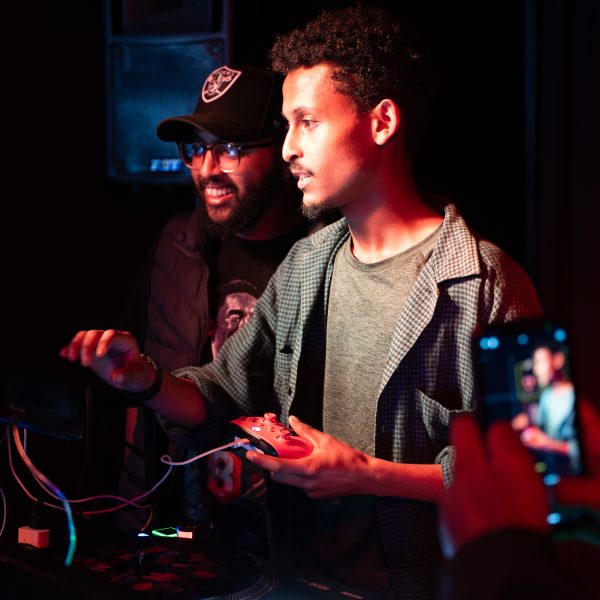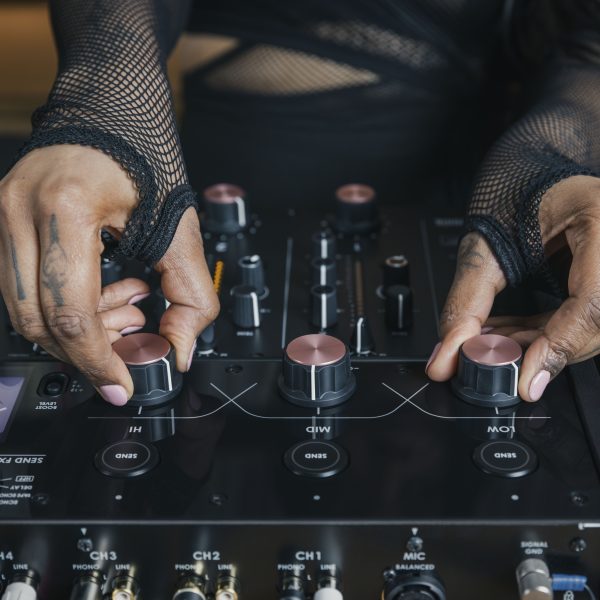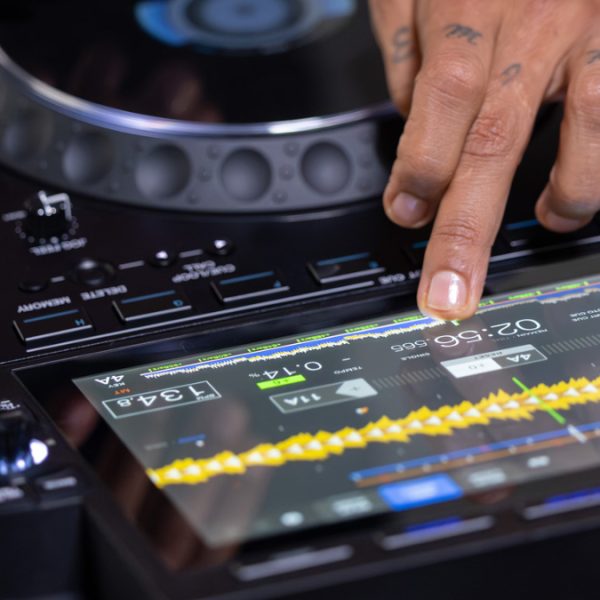The setup
Getting yourself set up as a mobile DJ requires a bit more upfront investment than most other forms of DJing. For your average “DJ for hire” or club DJ, you usually only need your headphones and your music (USB, laptop, vinyl etc). Essentially, it’s plug-and-play.
With mobile DJing, you need all the necessary equipment to create a party. That includes a stand or DJ booth, speakers, lighting, your music, headphones, a mic, and whatever DJ gear you decide on. “In the very early days, mobile discos were mostly home-built, diabolical things, unsafe and dangerous,” said Brian. “It was definitely a home-build industry. You’d build light boxes and things like that. But the safety aspect came into it. So manufacturers started making lighting effects, but they were heavy, power consuming, and expensive.”
Over time, Brian explained, equipment got cheaper, more professional and more portable—his go-to’s include the DDJ-FLX10 and the Opus Quad. Today, there are whole sections of the industry that cater to mobile DJs. When you’re investing, the key things to consider are portability, durability, and how professional things look. You won’t be impressing anyone with a cheap DJ stand, tiny speakers, and dim lights, but it might still be advisable to keep things affordable when you’re starting out—not only to get up and running, but also for the purpose of ultimately doubling up on some pieces of kit that are at risk of damage.
For transport, you need your own vehicle, and, according to Brian, preferably a van. “I use a van,” he said. “I started off with cars, but they’re not really a good idea. Everything’s on display in a car, you can get it nicked. When I left my day job, up to that point I used a car, and if I needed to move a big amount of gear, I’d hire a van. You can’t do it on public transport.”
Brian also recommended joining a trade association. In the UK, for instance, there are organizations set up for DJs to connect, share information, and cultivate a supportive community. “A trade association membership is quite a good way of starting, because you can meet and network with experienced DJs,” he said. “There’s NADJ (National Association of DJs), and SEDA (South Eastern Discotheque Association), which I’m on the committee of. We’ve got 200 members in the south east who meet up every couple of months. You end up with a load of people in a room who are DJs of all types. They might be bedroom DJs, they might be mobile DJs with years of experience. There might be one or two radio DJs, and there’s a few of the new internet streamers and those that turn up as well with their cameras, videoing everything. So that’s a great way for a DJ to start networking and learning more about it all.”
You’ll also need to get the right insurance in place. Public Liability Insurance is created to provide cover for accidental injuries to members of the public and damage to third party property. On that note, PAT (portable appliance testing) testing should be on your checklist. This is the process of checking electrical appliances for safety through a series of visual inspections and electronic tests.
It’s necessary to get to grips with setting up all your equipment efficiently, transforming a room into a party space. Then there’s setting up your own website and social media platforms. Having a strong, professional digital presence can make all the difference with getting bookings.
As Marcus concluded, “To be a mobile DJ you have to become very competent with a variety of disciplines. You become a bit of an electrician, a bit of a rigger, a bit of a health and safety guy, a bit of an MC, a bit of a host, a bit of a musical specialist, a bit of a mixologist. You know, all these different things form the foundation and then, if you want, you can go and pursue different avenues.”
What’s mobile DJing actually like?
Reading through what it takes to get started, you can probably already tell that mobile DJing takes a lot of work. And we haven’t even mentioned the physical process of transferring your equipment from your vehicle to the venue and back, which can be taxing, depending on your fitness levels. We explored the pros and cons with our experts, who spoke about a delicate balance between long hours, good pay, job satisfaction, and quality of life.
“Part of the reason why things like the DJ networks are important is because there are people there that understand your pain, and they understand the pitfalls of being a mobile DJ,” Marcus said. “I’ve calculated sometimes that I’ve gone 10 hours without having a conversation with someone, which is kind of weird. You leave the house at 2 PM, maybe have a chat with someone on the way to the gig, get there, do your intros with the clients, set up and get going. In that whole time you might not have a single real conversation with anyone, so it can be lonely at times.
“The plus-side of that particular element is it gives you a chance to analyze what you’ve done, and that’s where you hone the craft of people watching,” he said. “In a slightly less risky environment, say where you’re providing background music, you can experiment a bit and see how people react to certain tunes.”
“Being self-employed is great because I can choose when I get in the camper van and bugger off and when I come back,” said Brian. “But nobody tells you that you have to be a salesman, you have to be a marketing expert, you have to be an accountant, you have to be an advertising manager, you have to be an expert with social media—everything.”
Brian explained that he went from working 40 hours a week in his old job, to sometimes doing up to 80 hours per week with the mobile DJ business. “It’s bloody hard work, but I’m responsible to myself only,” he said. “And I love it to bits. It’s the best job ever.”








